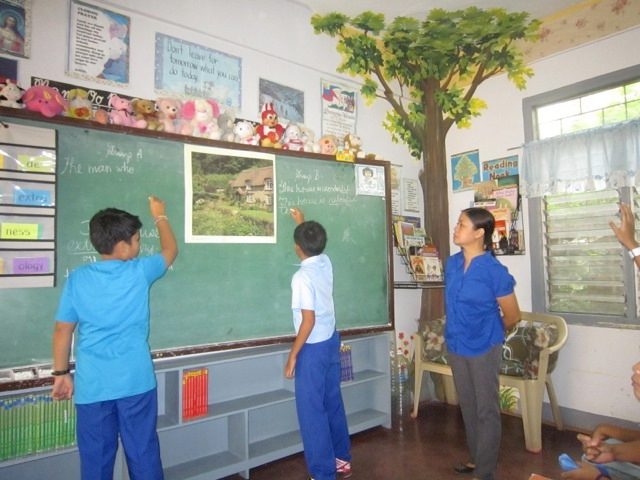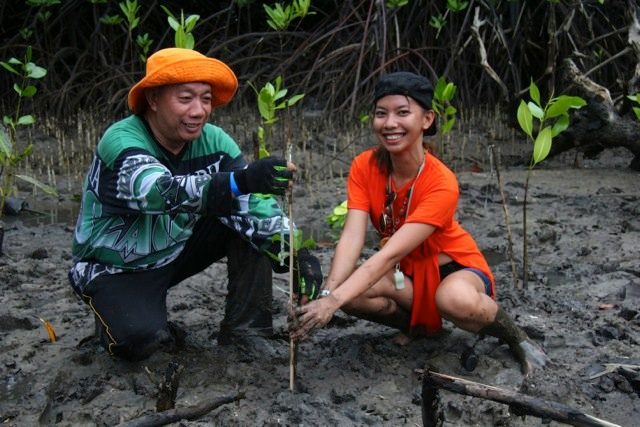SUMMARY
This is AI generated summarization, which may have errors. For context, always refer to the full article.
MANILA, Philippines – With their different passions and expertise, Anna Abellera, Dr Noel Ibis and Dr Resurreccion Sadaba – 3 of Metrobank’s 2014 Outstanding Teachers – have one thing in common: they never wanted to be a teacher at first.
Abellera, a Teacher III from Naga Central School I, wanted to be either a nun, a social worker, or a missionary. In her pursuit for “a career where all of them are present,” she decided to teach elementary kids instead.
Ibis and Sadaba both wished they could attend medical school when they were younger, but their families could not afford it.
Thinking he could pursue medicine later on, Ibis decided to teach first, but the fulfillment of seeing high school students transform made him stay. He is now a Master Teacher I at Vinzons Pilot High School in Camarines Norte.
Sadaba – an associate professor at the University of the Philippines-Visayas and one of the few researchers studying mangroves in the Philippines – says he is a now a teacher first, and a scientist second.
“I could not imagine myself working in any other profession except teaching, because teaching everyday in the classroom will always be a new experience; it’s never boring,” he says.

What it takes
The 3 may not have imagined being a school teacher at first, but the desire to teach was definitely there from the very beginning. (READ: On teaching, and why I want to write about it)
“Many can become teachers, but only a few can teach,” Sadaba says. For him, real teachers go beyond feeding students information; they mold and shape young minds by setting a good example; teaching not only what to learn but also how to learn.
Abellera agrees, and adds: “Only a few can teach, and only the brave ones dare to teach…Sometimes you really have to speak out, you have to mean what you say and say what you mean, but only the brave can do that.”
For Ibis, a real teacher makes a stand on various issues and empowers his students to do the same. (READ: Teaching: A labor of love)
Beyond lesson plans
The 30th batch of Metrobank’s Search for Outstanding Teachers consists of 4 elementary teachers, 4 high school teachers, and two college professors.
They are recognized for their competence, dedication to the work, effective educational leadership, and involvement in their communities. (READ: What are the roles of a teacher in the community?)
Another thing that keeps these teachers going is their different passions. For instance, Abellera is an avid fan and advocate of reading, while Ibis takes the extra mile to know the learning behavior of his students. For more than two decades, Sadaba has been studying mangroves and how they can protect coastal communities.
“My passion is in reading. I believe that it’s the one skill everyone should have. Everyone should know how to read,” Abellera, says.

As an english teacher, she developed award-winning reading program LEAP (Love for Extensive Academic Progress through Reading) which aims to increase the number of independent readers and to improve the reading habits and English proficiency of students.
She loves reading to the point that she ends up using all her take-home pay to buy books which she gives away to her students and co-teachers.
Her mother tries to stop her, but she keeps buying anyway: new books, old books, children’s books and modules for teachers. At one point, she even found a $100 bill inside one of the old books.
Of course, she bought more books with that money.
Ibis, a chemistry teacher, used to be impatient with his students. He always expected them to understand his lessons immediately, and to answer problem-solving questions quickly.
That is, until he learned educational psychology.
“With psychology, I get to process their emotions. How are you feeling? Are you comfortable solving the problem? How much effort have you exerted? They appreciate the subject better because of that. I’m processing their metacognitive experiences. They are comfortable telling you, ‘Sir, we don’t understand,’” he explains.

Since the early 1980s, Sadaba has always been interested in mangroves, writing books and doing research on them.
After Super Typhoon Yolanda highlighted the importance of mangroves and beach forests, he says there has been sustained public interest in restoring and rehabilitating these forests.
Sadaba is grateful for this, but he thinks there’s still a lot of things to do.
“It has to be an advocacy for a responsible environmental stewardship. We cannot be an environmentalist only if [we’re] not grounded on science. Some people claim to be environmentalists without understanding the science of it.”
‘Do better than me’
Still, at the end of the day, what these teachers simply hope for is to leave a mark. (READ: When passion-driven teaching succeeds)
Former students of Abellera are already teachers themselves, inspired by the teacher that had an impact on them. (READ: Why teachers are like mothers)
“Teacher, I saw how you teach and I saw how you enjoy teaching, and that’s why I also love to teach now. So I want to be like you,” she recalls them saying. She says the most rewarding part of teaching is seeing “another you in another person.”
Ibis knows choosing a course related to chemistry is not a popular route for high school students, so he finds fulfillment if even just one decides to take that road less traveled.
Taking a cue from Ibis, one of his students is now taking up graduate studies in Chemistry at New York University.

“Wow, so in our simple ways, we motivate them. With that, my decision was to continue teaching,” he says.
But Sadaba wants his students to do better than him, just as he “outperformed” his teachers before.
“I tell them ‘You should do better than me.’ That’s the only way I measure myself in school – if my students perform a lot better than me,” he says.
After decades of conducting class lectures and doing paperworks, these 3 teachers still have not grown tired of the career they have come to love.
They vow to keep learning and improving because, in the words of Ibis, “there’s no turning back, because you’ve already chosen the teaching profession.” – Rappler.com
Add a comment
How does this make you feel?
There are no comments yet. Add your comment to start the conversation.